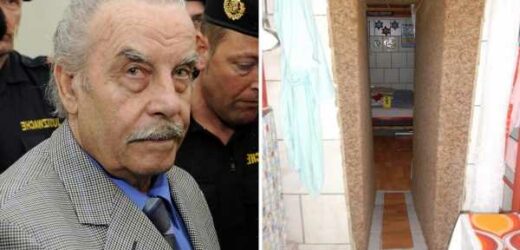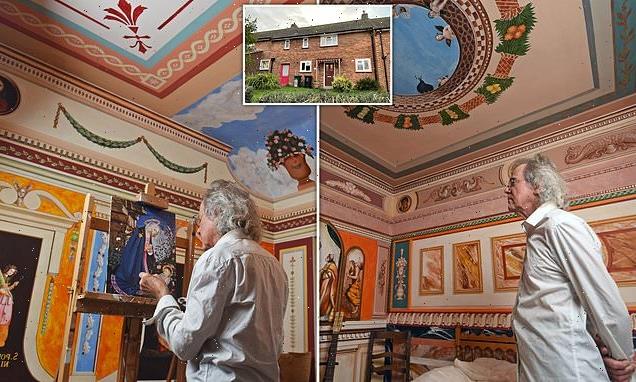OVER the last 25 years, a number of disturbing stories of twisted parents subjecting their children to unimaginable abuse and torture inside real-life houses of horror have been thrust into the public spotlight.
From Josef Fritzl to the Turpin family, the horrific cases include instances of helpless children being locked up for months or even years on end and enduring sickening acts of violence at the hands of those who are meant to love them most.
The most infamous of the cases is perhaps that of Fritzl, who for nearly 25 years held his daughter, Elisabeth, captive in a makeshift cellar beneath his Austria home where she was subjected to repeated acts of rape and forced to give birth to seven of her father's children.
ELISABETH FRITZL
Elisabeth, then 18, was reported missing on August 28, 1984, by her mother Rosemarie
For weeks, there was no word from the teen, leaving Rosemarie to assume the worst.
Then suddenly, out of nowhere, Rosemarie and her husband received a letter signed by Elisabeth, claiming she has grown tired of her family and had decided to run away.
When police arrived at the Fritzl home, Josef told investigators that while he had no idea where his daughter may have gone, he theorized that she'd likely joined a religious cult – something he claimed she had previously discussed.
But in reality, Fritzl knew exactly where his daughter was: she was being held prisoner around 20 feet below where the police officers have been standing.
He lured her into the basement under the ruse that he was fitting a new door on his newly renovated cellar and needed help carrying it downstairs.
As soon as he fixed the door to its hinges, he swung it open, forced Elisabeth inside, and knocked her unconscious with an ether-soaked towel.
Elizabeth would remain inside the dirty, windowless cellar for the next 24 years.
Josef would visit his captive daughter almost every day, heading down to the cellar each morning at 9am, telling his wife he was working on plans for the machines he designed and sold.
He would rape her nightly, something he'd been doing since she was 11-years-old.
By 1986, Elisabeth fell pregnant, though miscarried after 10 weeks. Two years later, she fell pregnant again, this time carrying for the full nine months.
She gave birth to a baby girl called Kerstin in August 1988. Two years after that, she gave birth to a second of her father's children, a baby boy named Stefan.
Kerstin and Stefan stayed inside the basement with their mother throughout the duration of her imprisonment. They survived off weekly rations of food and water brought to them by Josef.
Elisabeth, meanwhile, attempted to educate the children in an attempt to provide them with the most normal life she could, considering the horrific circumstances they found themselves in.
She would go on to give birth to five more children. One died shortly after birth, a second stayed in the basement and three others were taken upstairs to live with Josef and Rosemarie.
To cover his tracks, Fritzl staged elaborate discoveries of the children, hiding them in bushes on the property or pretending to find them on the front doorstep.
Each child was found with a note accompanying it, with a message claiming to be from Elisabeth in which she said she couldn't take care of the baby and wanted to leave them with her parents to raise.
Social services never questioned the miraculous discoveries and permitted the Fritzls' to raise the children as their own.
Elisabeth eventually escaped her father's basement in 2008, aged 42. It came after her 19-year-old daughter Kerstin fell seriously ill, and Elisabeth begged her father to take her to the hospital.
A reluctant Josef agreed. He removed Kerstin from the cellar and called an ambulance, claiming that he had a note from Kerstin’s mother explaining her condition.
Police grew suspicious and began questioning Kerstin while she was being treated. They then reopened their investigation into Elisabeth's disappearance.
On April 26, 2006, Joseph released Elisabeth from the cellar for the first time in 24 years. She went to the hospital and told police what her father had done to her.
Josef Fritzl, now 86, was sentenced to life in prison, which he is serving in Garsten Abbey. In 2009, he changed his surname to Mayrhoff to avoid recognition.
Elisabeth and her children have assumed new identities and are living in an undisclosed location in Austria, surrounded by surveillance cameras and police.
Rosemarie died in 2012. Before her death, she and Elisabeth had reportedly rekindled and grown close.
NATASCHA KAMPUSCH
Also in Austria, in 1998, a 10-year-old Natascha Kampusch had been living with her family in Vienna's Donaustadt district, when she was abducted on her way to school.
For eight years she was held captive by Wolfgang Přiklopil, a communications technician, until her remarkable escape in August 2006.
For the first six months of her abduction, she was held in a small windowless and soundproof cellar underneath Přiklopil's garage in his home in the town of Strasshof an der Nordbahn.
As the years passed, Kampusch was afforded more freedoms. At first, she was taken outside for short walks and eventually allowed into his home during the day time.
After her 18th birthday, she was allowed to leave the house with him, but was reportedly told that the windows were booby-trapped with high explosives and warned her that he was carrying a gun and would shoot her if she tried to escape.
On one occasion, she was even allowed out to accompany Přiklopil on a skiing trip.
However, she finally escaped her captor in August 2006 when she was vacuuming his car.
Přiklopil was distracted by a phone call and Kampusch used to opportunity to run.
She ran to the home of a neighbor who called the police, telling them that for years she had been raped, beaten and starved by Přiklopil.
He took his own life shortly after her escape.
Kampusch now owns the house in which she was imprisoned, which was given to her after Přiklopil's death.
She penned a book about her captivity in 2010, titled “3,096 Days", which was later developed into a German-language film of the same name.
JAYCEE LEE DUGARD
On June 10, 1991, Jaycee Lee Dugard, 11, was abducted by Philip Garrido and his wife Nancy Garrido, as she walked to the bus stop in South Lake Tahoe, California.
Phillip had stopped his car next to Dugard, rolled down the window and tased her unconscious with a stun gun.
For the next 18 years, Jaycee endured unspeakable horrors at the hands of the Garridos, handcuffed in a sound-prooded dungeon beneath their home.
She was raped repeatedly and even gave birth to two daughters – her first when she was 14, and her second when she was 17.
Authorities were altered in August 2009, when Garrido, who had a previous conviction for rape, took his daughters to the campus of UC Berkley where he inquired about holding events for his religious organization.
Lisa Campbell, one of the members of the campus staff, told him to return the following day but felt suspicious about him. Campbell asked Berkeley police officer Ally Jacobs to conduct a background check on Garrido.
When it was discovered that Garrido was a registered sex offender, his parole officer was contacted. Throughout his parole, Phillip maintained he was childless.
When his parole officer was informed that two children had accompanied him to the campus, Phillip was ordered to attend a parole meeting.
Nancy, Jaycee and the two children accompanied him to the parole meeting.
Garrido initially insisted that Jaycee and the two girls were relatives but later cracked under questioning.
He and Nancy were later arrested and charged with 29 felony counts including rape and false imprisonment.
Authorities raided the Garrido home and discovered the silver-colored car used in Jaycee's abduction.
Jaycee was reunited with her mother in 2009, aged 29.
Phillip was sentenced to 431 years to life in prison in June 2011. Nancy was sentenced to 36 years to life, also in June 2011. They are both up for parole in 2034.
In a statement read out in court to Garrido, she said: "As I think of all of those years I am angry because you stole my life and that of my family … I hated every second of every day of 18 years because of you."
In an interview with ABC 20/20 in 2016, she said of her healing process: "It's taken a lot of time. It hasn't happened overnight.”
ARIEL CASTRO KIDNAPPINGS
After leaving a cousin’s house in August 2002, 21-year-old Michelle Knight disappeared.
Less than a year later, in April 2003, 16-year-old Amanda Berry vanished after leaving her job at Burger King.
The year after that, on the way home from her middle school, 14-year-old Georgina "Gina" DeJesus disappeared without a trace.
All three were taken to a home in the Tremont neighborhood of Cleveland and chained, raped, and starved by Ariel Castro, a former city bus driver with a history of domestic abuse.
Castro had offered each girl a ride in his vehicle, then lured them into his home and brought the girls into his basement. Later, they were all kept in locked upstairs bedrooms, forced to use plastic toilets, fed one meal a day, and bathed once per week.
Amanda Berry gave birth to a baby girl while in captivity. Knight, meanwhile, told police she fell pregnant five times.
Berry was able to escape on May 6, 2013, after Castro failed to lock a large door in the house. She screamed to a neighbor, who kicked a hole through the bottom of a storm door and freed her and her then-six-year-old daughter.
She called police, telling them: "Help me. I’m Amanda Berry. I’ve been kidnapped and missing for 10 years. I am here. I am free now.”
Within minutes, Cleveland Police discovered Gina DeJesus and Michelle Knight, who had been chained, tortured and abused along with Berry for a decade.
Castro was convicted for kidnapping and raping the three women and sentenced to life plus 1,000 years in prison. He died by suicide a month after he was sentenced.
Two months after their escape, they released a video statement thanking the public for their support. The Cleveland Courage Fund also raised over $1 million to help the three victims transition to a normal life.
Castro's home has since been demolished. It's now a garden.
THE TURPIN SIBLINGS
When the 13 Turpin children were rescued from their abusive parents in 2018 the extent of their suffering shocked the world.
The malnourished siblings, who ranged from two to 29, were locked in cages and chained to beds by parents Louise and David Turpin, beaten until they bled, sexually abused and starved, over a period of almost two decades.
The alarm was finally raised in August 2018 when 17-year-old Jordan Turpin managed to slip out of a window of their Californian home and raise the alarm.
David, now 60, and Louise, 53, were jailed for life on February 29 on counts of child cruelty, false imprisonment and torture.
Now, in an ABC special with Diane Sawyer, Jordan and older sister Jennifer, 33, have revealed the horrific extent of their abuse – and their joy at their eventual escape from the house of horrors.
As the oldest child, Jennifer remembers living in a nice neighborhood in Texas, where her father worked as an electrical engineer and Louise as a stay-at-home mum.
But she grew up around filth and squalor – a house strewn with rubbish, feces and mold – and was at the mercy of her mother’s violent mood swings.
She said she was shunned at school because she wore the same clothes every day before being removed in third grade.
After moving to a more isolated home in Rio Vista, Texas, when Jennifer was 11, the couple had more children and the neglect turned to physical abuse.
The evil couple would quote the Bible to justify the frequent beatings.
David used belts and sticks to whip the children. Jennifer recalled one moment when she said her father picked her up, feet off the floor, and slammed her into a wall.
Both parents would attack the children for the most minor misdemeanor – with Jennifer revealing that even crayoning outside the lines of a colouring book would make her mother pull her hair or throw her across the room.
On one occasion, a child was thrown down the stairs for daring to go into her mother’s bedroom.
When Jennifer was 18, the evil couple made 10 of the children move into a trailer in a remote part of their property, taking only their youngest two before driving away.
They brought meager groceries once a week, or sometimes fortnightly, leaving the children starving.
When the family moved to California, in 2010, neighbors found filth and feces throughout the house and ropes tied to children's beds as if used for restraint.
In her new home, Louise racked up huge credit card debt and hoarded children’s clothes, games and toys which she would never give to the children.
While their parents binged on fast food, and taunted them with freshly baked pumpkin pies which they were forbidden to touch, Jennifer says the children ate once a day – getting a peanut butter sandwich, a frozen burrito or chips.
When they were eventually rescued, the children were so malnourished that they were all assumed to be under 18, although seven were adults.
Jennifer weighed just 5st 12lbs. An 11-year-old child was so malnourished that her arm circumference was the equivalent of a four-and-a-half-month-old baby, investigators said.
By the time Jordan raised the alarm, the Turpins had been regularly chaining their children to bunk beds.
Jordan Turpin revealed she was in a room where two of her little sisters had been chained to their beds for as long as four months and their agony spurred her to get help.
Jordan worked on her escape plan for about two years and, knowing she needed proof, took pictures of her chained sisters on an older brother’s deactivated phone.
Finally, in January 2018, she made her move after hearing her raging mother screaming about moving the family to Oklahoma.
Jordan escaped through a window, ran to the street and called 911. Less than two hours later, their parents were arrested.
Jennifer tells the show that after waking up in hospital, the day after the arrest, she “put on music and danced.”
Jordan recalls going to the park with two of her sisters.
“I was so excited because I could smell the grass,” she said. “I was like, ‘How could heaven be better than this? … Oh my gosh, this is so free, this is life.’”
We pay for your stories!
Do you have a story for The US Sun team?
Email us at [email protected] or call 212 416 4552.
Like us on Facebook at www.facebook.com/TheSunUS and follow us from our main Twitter account at @TheSunUS
Source: Read Full Article



















